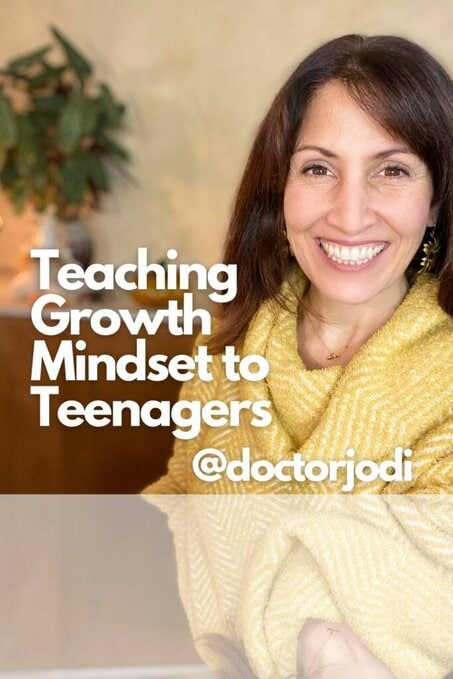Having a growth mindset means that your teenagers know their power to change and develop themselves.
Let’s be clear; they have personal agency–the sovereign power to respond, affect, and develop themselves. They have always had personal agency. They can’t not have it because they are born with a brain that has evolved for millions of years to solve problems, figure things out, and adapt. Your teen is wildly adaptable. You and I witness that daily when we watch them move through their lives. Unfortunately, Western culture is training them to look for and find their deficits, faults, and inadequacies, rendering their power invisible.

Instead of seeing how powerful they are, teenagers feel increasingly powerless, worthless, and out of control. This is because they get thousands of messages daily, convincing them they are powerless, worthless, and out of control. (Watch my TEDxWilmington Talk at the bottom of this post to discover what and how these messages influence your kiddos.) It is your job, as their parents, to counter the effects of these societal messages and teach a growth mindset. Here’s how:

A growth mindset is the opposite of a fixed mindset.
A “fixed mindset” is thinking you are a defined you; thus, you must manage inside that limited identity.
Teens with a fixed mindset are more likely to:
- Think negative thoughts about themselves and others
- Feel like things are not worth their effort
- Fear failure
- Rationalize away constructive feedback
- Avoid risks
- Feel threatened by the success of people around them
- Act rigid about expectations, schedules, and plans

Unfortunately, most traditional ideas of mental health encourage a fixed mindset: this is you, and you have to learn to manage it. Luckily, that is not the reality of mental health problems.
Anxiety and depression come from CONTEXTS, not internal illnesses.
Yes, biology is involved, but our biology (e.g., neurotransmitters, hormones, peptides) responds to the context of our experiences, memories, stories, feelings, and thoughts.
Teaching your teenager a growth mindset will set them up to change and get new perspectives on the context of those experiences, memories, stories, feelings, and thoughts, thus making them experience emotional relief and feel well and robust. A growth mindset will help them build their confidence to take on the world. Watch this video from my Monday LIVE broadcasts. (I go live on Facebook and YouTube every Monday at 11 am ET.)
Four Tips to Teach a Growth Mindset to Teenagers
Sharing is caring: Tweet
Here is a summary of the video
Teaching Your Teen to Have a Growth Mindset
Number 1: Teach them how to deal with problems
Sometimes teens are too close to the chaos of problems and need a reset. Show them how to take a psychic step back from that chaos and instead view it from a distance. This witnessing state can immediately ease their nervous system making it easier to think rationally and calmly about a response that is in the highest good of everyone, especially themselves. People don’t make regretful decisions from this position!
Number 2: Compliment their specific ideas and actions.
People are unique and have well-honed problem-solving skills. Make sure you reflect this back to them when you notice it. In our culture, people take these things for granted, but they are exceptional when you think about them. Your teens have been so accustomed to seeing their deficits that it captures their attention. You must repeatedly redirect their attention to their brilliant, unique abilities and skills so they soon begin doing it for themselves. This is an essential parenting task that I explain in my parenting programs.
Number 3: Teach them to do difficult things consistently.
Check out my TEDxWilmington talk at the bottom of this blog post. Plus, this video helps explain this one. When People consistently do demanding things, it trains them to stop resisting challenges. It is mainly in the resistance where humans develop inner conflict and create false stories that make them suffer. When humans get used to strenuous tasks, they build confidence and connect to their agency and authority.

Number 4: Teach them to be kind to themselves.
In my 26 years of counseling others, I’m privileged to hear their rarely shared inner conversations. I have learned that people do not know how to “do self-compassion.” They have never been taught. Let’s fix this: Teach your children how to be kinder to themselves so that they can stop the destructive cycle of negative self-judgment. If you don’t know how to do self-compassion, learn it. You will want that for yourself too. Watch this video: How to have self-compassion.
You’ll want to grab my Parenting COMBO PACK if you have a young person struggling with anxiety or depression. It includes:
- The Parents, Educators, & Counselors Audio Guide for “Anxiety…I’m So Done with You!”
- A free paperback copy of “Anxiety! I’m So Done with You!”
- The Forgiveness, Self-care, & Affirmations e-courses
- The Empowering Teens for Emotional Wellness e-course
- The Raising Resilient & Happy Kids e-course
I hope you like this video on How to Teach a Growth Mindset to Teenagers. Please comment below, head over to my podcast Bandwidth Recovery and leave a five-star review, go to YouTube and click the bell so you know when I am broadcasting LIVE and can join me. Also, come hang out with me on TikTok @doctorjodi.
